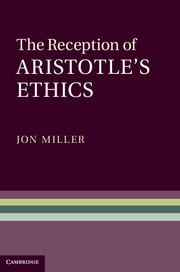Book contents
- The Reception of Aristotle's Ethics
- Contents
- Notes on contributors
- Acknowledgments
- A note on abbreviations and transliteration
- Introduction
- Chapter 1 The Nicomachean Ethics in Hellenistic philosophy
- Chapter 2 The transformation of Aristotle's ethics in Roman philosophy
- Chapter 3 Aristotelian ethics in Plotinus
- Chapter 4 St. Augustine's appropriation and transformation of Aristotelian eudaimonia
- Chapter 5 The Arabic and Islamic reception of the Nicomachean Ethics
- Chapter 6 Maimonides’ appropriation of Aristotle's ethics
- Chapter 7 The relation of prudence and synderesis to happiness in the medieval commentaries on Aristotle's ethics
- Chapter 8 Using Seneca to read Aristotle
- Chapter 9 Aristotle's Ethics in the Renaissance
- Chapter 10 The end of ends? Aristotelian themes in early modern ethics
- Chapter 11 Affective conflict and virtue
- Chapter 12 Kant and Aristotle on ethics
- Chapter 13 The fall and rise of Aristotelian ethics in Anglo-American moral philosophy
- Bibliography
- Index
Chapter 7 - The relation of prudence and synderesis to happiness in the medieval commentaries on Aristotle's ethics
Published online by Cambridge University Press: 05 February 2013
- The Reception of Aristotle's Ethics
- Contents
- Notes on contributors
- Acknowledgments
- A note on abbreviations and transliteration
- Introduction
- Chapter 1 The Nicomachean Ethics in Hellenistic philosophy
- Chapter 2 The transformation of Aristotle's ethics in Roman philosophy
- Chapter 3 Aristotelian ethics in Plotinus
- Chapter 4 St. Augustine's appropriation and transformation of Aristotelian eudaimonia
- Chapter 5 The Arabic and Islamic reception of the Nicomachean Ethics
- Chapter 6 Maimonides’ appropriation of Aristotle's ethics
- Chapter 7 The relation of prudence and synderesis to happiness in the medieval commentaries on Aristotle's ethics
- Chapter 8 Using Seneca to read Aristotle
- Chapter 9 Aristotle's Ethics in the Renaissance
- Chapter 10 The end of ends? Aristotelian themes in early modern ethics
- Chapter 11 Affective conflict and virtue
- Chapter 12 Kant and Aristotle on ethics
- Chapter 13 The fall and rise of Aristotelian ethics in Anglo-American moral philosophy
- Bibliography
- Index
Summary
Aristotle's two accounts of the nature of happiness in Nicomachean Ethics i and x have caused much disagreement concerning the precise constitution of human goodness, or happiness (eudaimonia). While all may agree that happiness is an activity of the soul, the question remains concerning the exact relation between the moral and intellectual virtues, or the practical and theoretical life. H. G. Gadamer here notes the tension in the two accounts:
It can be determined that practical wisdom (phronesis) and not only theoretical reason is the supreme virtue of an intellectual being. So the question remains how both these perfections and types of knowledge relate to one another. We therefore return again to the ancient problem of the primacy of theoria over human praxis.
Even as astute a reader of Aristotle as Gadamer has difficulty in determining the importance of some human accomplishments in relation to others. The assertion that both practical wisdom (phronesis) and intellectual wisdom (sophia) comprise the supreme good, and that both must be considered as the highest virtue, needs careful consideration. The uncertainty concerning the relation between the practical and the theoretical has a firm basis in Aristotle's text, and Gadamer's approach seems close to what Aristotle may have intended.
In the last chapters of the N.E. Aristotle praises the perfection of the intellect, the purely rational part of the soul, as the highest human achievement. This is the clearest expression of the supremacy of the theoretical life, and its dominant role in the production of happiness. If contemplation is supreme, then all other actions and pursuits must be directed toward the contemplative life. Only contemplative activity would merit the designation ‘supremely good’, since it not only perfects the best part of human beings, but its objects are also knowable in themselves (1177a19–22). Contemplation is the most continuous, independent and self-sufficient of human accomplishments, since it demands nothing outside the intellectual fervor and excellence of the contemplative. Aristotle can think of nothing more desirable than the pleasure of contemplating truth (1177a23).
- Type
- Chapter
- Information
- The Reception of Aristotle's Ethics , pp. 125 - 154Publisher: Cambridge University PressPrint publication year: 2012
- 2
- Cited by



